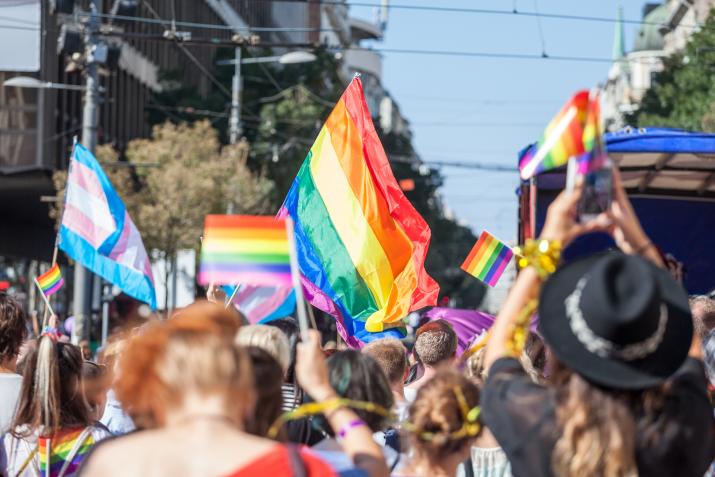
Rainbow flags soar during an LGBTQ Pride event. Image from iStock
Published May 24, 2023, last updated on June 1, 2023 under Research News
In Brazil, one of the most dangerous countries for violence against sexual and gender minorities, a mobile phone app can be a lifeline. Called Dandarah Rise, the app allows users to report specific locations of violence and discrimination against LGBTQ+ and transgender individuals. It also connects people to needed health services.
“This app has saved lives,” says Kate Whetten, Ph.D., (They/them), co-director of Duke’s Sexual and Gender Minority Wellness Program, who co-authored a study published in March about the app’s effectiveness.
It’s one example of the tools sexual and gender minorities are using to protect themselves against a rising tide of violence and discrimination. While LGBTQ individuals have endured stigmatization for centuries, new laws targeting sexual and gender identities in the U.S. and other countries are taking a toll on physical and mental health, Whetten says.
“People are really suffering from anxiety, post-traumatic stress disorder and more,” Whetten says. “We want to know where they get support, relief and document their experiences.”
In 2017, Whetten and DGHI colleague Sara LeGrand, Ph.D., launched a research study called Sexual and Gender Minority Mental Health in Low- and Middle-Income Countries (SMILE). Research during SMILE’s pilot phase revealed sexual and gender minorities across identities have poorer mental health, including higher incidence of depression and PTSD and higher risks of substance abuse, than heterosexuals. Rates of suicidal ideation were higher than among U.S. soldiers returning from combat.
Based on those outcomes, researchers are now inviting sexual and gender minorities in three countries – Brazil, Vietnam and Kenya – to take a confidential survey to better understand the impacts of stigma and discrimination on mental and physical health. The project aims to collect responses from 3,500 people of various sexual and gender identities in each country.
Whetten, who identifies as a nonbinary queer person, has seen the toll personally. They’ve lost friends to suicide.
“You have to look at LGBTQIA+ people as individuals with mental health and physical needs, higher rates of cancer and more as a result of what they face in their lives,” says Whetten, a professor of public policy and global health who also directs the Duke Center for Health Policy and Inequalities Research (CHPIR). “I take this work incredibly seriously.”
LeGrand (she/they), an associate professor of global health and SMILE’s co-principal investigator, says in many countries, care for sexual and gender minorities can be severely limited or non-existent due to discrimination or lack of training.
“The onus is on the individual to fit into the cisgender, heteronormative framework of care,” says LeGrand, who identifies as genderqueer. “We need more people to step up and become activists with ferocity to protect all of us.”
SMILE LEADERSHIP

Kathryn Whetten
Research Professor of Global Health
In Brazil, one such activist is Jacqueline Gomes de Jesus, a professor of psychology at the Federal Institute of Education, Science and Technology in Rio de Janeiro. A former CHPIR visiting scholar, she is coordinating the Brazilian site for SMILE.
“It’s a Brazilian tradition to be against sexual and gender minorities,” says Gomes de Jesus. “We’ve been striving and resisting for a long time against discrimination in many ways with organizations, social movements and having a sense of community.”
While two transgender women now serve in Brazil’s National Congress, Gomes de Jesus says acceptance and safety are still not the norm in the country. Transgender people are still often forced by families into homelessness, where they are more vulnerable to violence and abuse. At least 125 transgender people were murdered in Brazil in 2021, according to statistics from Transrespect Versus Transphobia Worldwide, which monitors killings of gender-diverse and transgender people.
Brazil is not alone in its history of targeting sexual and gender minorities. Uganda just passed a harsh new anti-GBTQ law that imposes penalties up to life in prison for homosexual activity, and similar legislation is being considered in Ghana and other countries. In the U.S., at least 417 anti-LGBTQ bills have been introduced in state legislatures this year according to a CNN report. Some states have passed laws banning gender affirming medical care for adolescents and transgender individuals from participating in sports aligning with their gender identity.
“We want to assure the rights of minorities, but we need to strive to have more research and more ways to treat mental health, too,” says Gomes de Jesus.
Researchers hope the SMILE project survey will inform new interventions to protect sexual and gender minorities’ physical and mental well-being. Many of those approaches will need to be tailored to local cultures and contexts, but Whetten and LeGrand also expect to find a few effective measures, such as Brazil’s Dandarah Rise app, that could work in other settings.
“We hope to use it in different populations such as Kenya and even Durham,” says Whetten.


